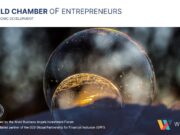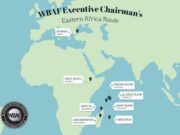The time is ripe for new vehicles that can increase the impact
of micro-investing, where small investors can reap large gains.
Prof Ketikidis and Adriane Thrash explain.

 PROF. PANAYIOTIS
PROF. PANAYIOTIS
H. KETIKIDIS
Chairman, South East European
Research Centre
ADRIANE THRASH
Co-Founder, Innovation Farm
In more advanced ecosystems, Angel Investors are a well-developed link in the startup finance chain. But in early-stage ecosystems, where the conditions are more challenging, Angel Investing is still in the formative phase. In such ecosystems, 3F funding resources are typically weak, and these investments are often undertaken as matters of obligation or favor rather than for entrepreneurial reasons. Support structures for startups such as acceleration programs and incubators may offer funding and mentoring, but this is limited in scope and duration. Venture capitalists can cherry-pick the best teams to invest in, yet there are many worthy startups left behind.
The resulting gap in the investment landscape provides an opportunity for small investors to reap large gains – think ‘micro-Angels’ writing average cheques of €10,000 to €50,000. Veryearly stage company valuations are by necessity quite low, and ‘first money in’ Angel Investors can leverage this to their advantage – taking a larger amount of equity at a lower price, along with other advantages, such as discounted follow-on, preferred options, and non-dilution terms.
Given this opportunity, why hasn’t micro-Angel Investing grown as fast as it could have in early-stage ecosystems? Looking at the landscape, we have identified three impediments:
1. Deal-flow
Identifying, contacting, and reviewing promising cases requires a great deal of time and energy, especially for startups whose product falls outside of an investor’s sector experience, ultimately requiring further research to assess the market opportunity.
2. Dilution
Organised funding schemes – when available – lead to prohibitive dilution for small investors; while co-investment or syndicate schemes are not widely available in early-stage ecosystems.
3. Diversity
Achieving spread of risk requires an investor to be involved in several startups, thus needing even more time to source attractive opportunities.
For micro-Angels who do invest, the process is both exciting and complicated; and while they may enter an investment with great enthusiasm, they can lose their appetite if returns are less than expected. This attrition rate resembles the classic startup lifecycle, where Angel Investors get discouraged after losses and experience their own “Valley of Death.” Those who are new to investing and have limited initial resources can greatly benefit from mechanisms and networks that help them to make better decisions; thereby leveraging their investment muscle as much as possible to increase success rates.
“As Business Angels,
our investment
philosophy is simple:
go for the exit, but be
ready for the curve.”
In addition, anecdotal and statistical evidence suggests that non-financial support is equally as important as cash for the majority of early-stage teams; and, while most Angels expect to contribute mentoring and networking along with their investment, they may not have the time or experience to take on an active operational role in a portfolio company.
The time is ripe for new vehicles that can increase the impact of microinvesting for the benefit of Angels and Startups. Consider mechanisms that could combine advising services with investment equity stakes to ease shortages of 3F resources. This would produce a chilling effect on the veryearly stage growth of companies, investors, and ecosystems. Alternatively, curated portfolios can enable faster dealflow; better IRR and spread of risk; and lower dilution. Ultimately, these efforts can serve as multipliers by providing co-investment opportunities to further enhance IRR and speed growth, either with other syndicates or VC funds.
As Business Angels, our investment philosophy is simple: go for the exit, but be ready for the curve; and our investment decisions are governed by a combination of knowledge, experience and instinct that comes from repeated deals (some good and some not). We believe that earlystage focused initiatives are needed to address the fundamental needs of both micro-Angels and startups; thus filling a critical gap in the funding landscape and increasing the numbers of companies and investors who make it out of the ‘Valley of Death’. New mechanisms, combined with strong global networks, such as the WBAF, provide vital opportunities for synergies that further enhance our momentum as a crucial link in the investment chain.




























